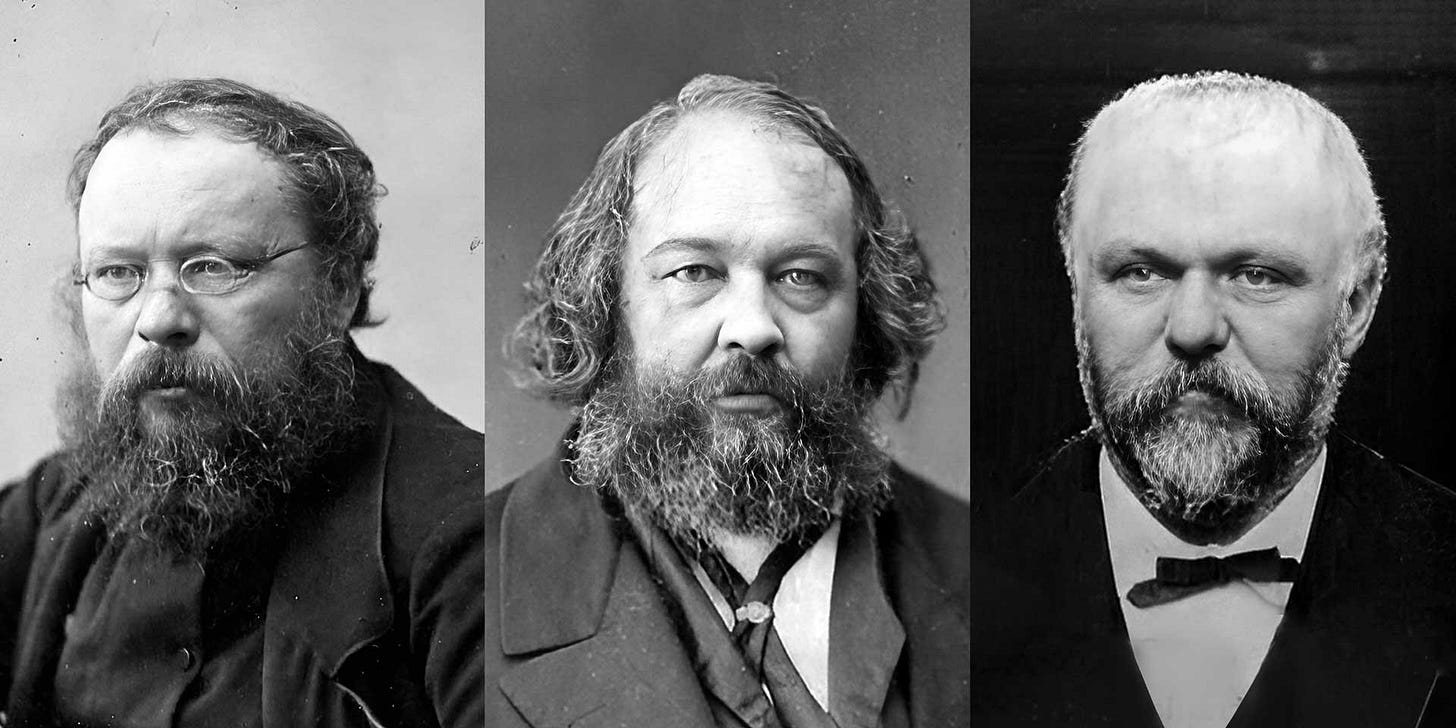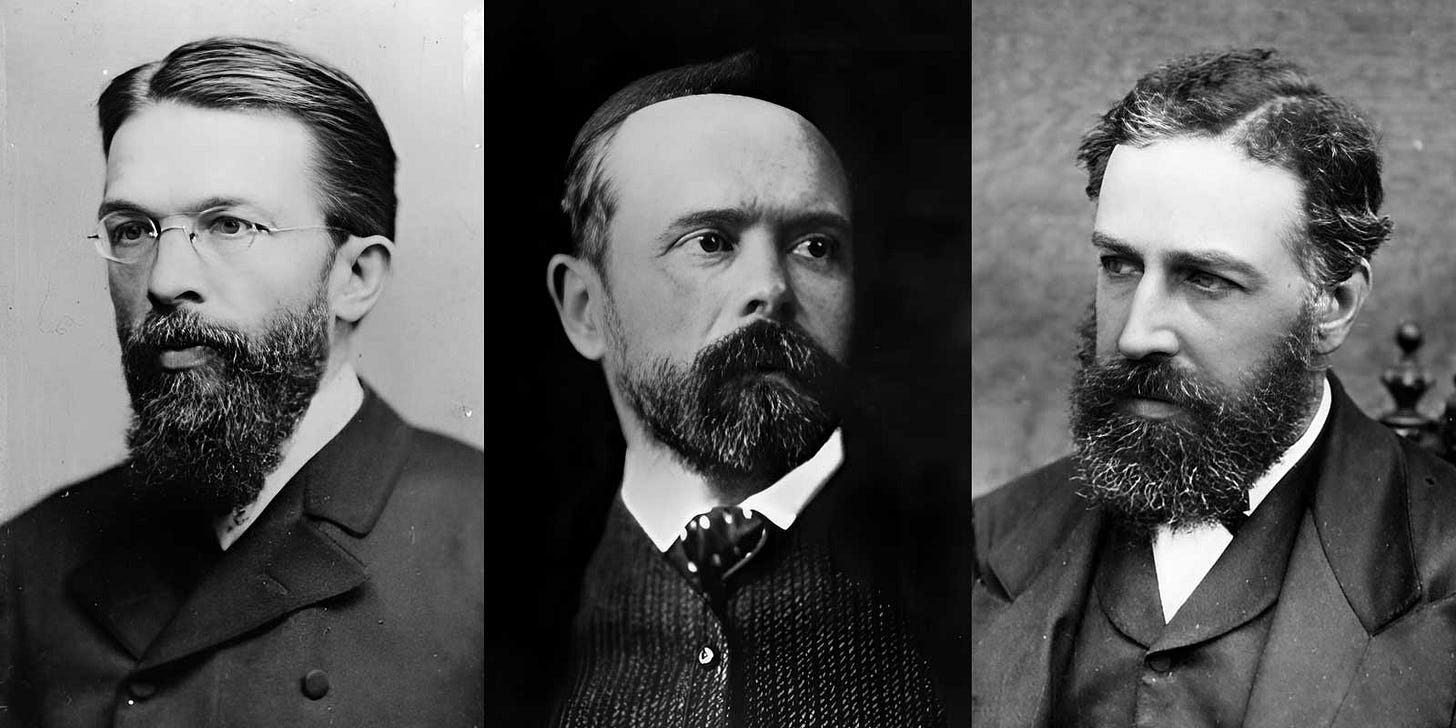Disambiguating Capitalism
A historical journey through the rhetorical origins of a loaded term
Capitalism.
The word has become a central and often contentious term in contemporary political discourse. It's been used to describe everything from the free market to corporate greed, from individualism to exploitation. Yet despite its ubiquitous presence, the meaning of Capitalism remains contested. Some see it as the engine of innovation and prosperity, while others view it as a system of oppression and inequality. In this article, we'll delve into the meaning of Capitalism, explore its historical origins, core principles, and contemporary usage and misuse.
On the pro side, Capitalism is seen as a synonym for free markets, competition, and entrepreneurship. Proponents argue that Capitalism allows individuals and businesses to pursue their own self-interest, leading to increased efficiency, innovation, and wealth creation. They believe that the profit motive incentivizes businesses to produce goods and services that people want and need, and that this leads to greater prosperity and well-being for society as a whole. They also argue that Capitalism is the most effective system for distributing resources and allocating goods and services, as it allows for the market to determine prices and quantities.
On the anti side, Capitalism is seen as a system that prioritizes profits over people, leading to inequality, exploitation, alienation and oppression. Opponents argue that Capitalism perpetuates a winner-takes-all mentality, where the wealthy accumulate all the resources and the poor struggle to get by on slave wages. They believe that the pursuit of profit leads businesses to prioritize short-term gains over long-term sustainability. They also argue that Capitalism creates power imbalances between employers and employees, laying the groundwork for exploitation and abuse.
Before Capitalism
Although we can hardly imagine a world without it today, the term “Capitalism” was not widely used or accepted until the late 19th and early 20th centuries. Prior to that, terms like “Mercantilism”, “commerce”, and “political economy” were more common in discussions of economic systems, and the state played a significant role in regulating and promoting economic activity. Indeed, it wasn’t until about 400 years ago that there was even something to call “Capitalism”.
During the medieval period, Europe was primarily an agrarian society with limited trade and commerce. Feudal lords held power, and the economy was based on a system of Feudalism in which serfs worked on the lord's land in exchange for protection and a share of the crops.
As the Middle Ages gave way to the Early Modern period, European economies began to diversify, with the growth of trade and commerce, and the emergence of artisanal and craft industries. The rise of towns and cities facilitated the growth of markets and trade networks, and the expansion of European colonialism brought new sources of wealth and resources.
However, economic growth during this period was uneven, with significant disparities in wealth and opportunity between different regions and social classes. The economy remained largely agrarian and was still characterized by feudal relationships between lords and peasants, and growth of trade and commerce was constrained by political instability and conflict.
The rise of Mercantilism and the birth of modern economics in the 16th and 17th centuries ushered in a new era of economic thought and practice. It prioritized the accumulation of wealth through international trade and the development of domestic industries, and advocated for government intervention in the economy to achieve these goals.
The Modern Economic Era
In the late 18th century, Scottish philosopher and economist Adam Smith introduced the idea of free markets in his seminal work, The Wealth of Nations. Smith argued that free markets, where individuals are free to pursue their own self-interest without interference from the state, were the most efficient and beneficial way to allocate resources and promote economic growth. This idea became a cornerstone of classical liberalism and laid the groundwork for laissez-faire economic policies that would be adopted in many countries in the following centuries.
During the period between the late 18th and mid-19th centuries, the adoption of this kind of laissez-faire economics brought significant advancements in prosperity across many nations. Belief in free-market principles led to a decrease in government intervention and regulations, allowing businesses and entrepreneurs to operate with greater flexibility and innovation. This led to an increase in industrialization, job creation, and economic growth.
As a result, living standards improved for many people, and new consumer goods became more widely available. However, the laissez-faire approach also contributed to social and economic inequality, as those who accumulated wealth enjoyed significant advantages over those who did not.
Enter Louis Blanc. Louis Blanc was a mid-19th century French politician and socialist who advocated for worker-controlled cooperatives supported by the government to address social and economic inequality. He also coined the term “Capitalism” in his 1850 work The Organization of Labour, using it pejoratively to criticize private property and shift the focus away from “free markets” towards a more negative portrayal of an economic system driven by the pursuit of profit.
He believed that the economic system at the time was fundamentally unfair, and argued that a small group of property owners wielded power to accumulate wealth and used it to exploit workers while maintaining their privileged status. Believing that the economic system was inherently exploitative, he considered it the government's responsibility to regulate and control the economy.
Dissecting Language
The word “Capitalism” is derived from the Latin word "capitalis," which means "of the head" or "pertaining to the head," referring to the accumulation of wealth and power in the hands of the few. This emphasizes the negative connotations of the term, suggesting that Capitalism is merely a system of greed and exploitation.
In contrast, the term “free market” emphasizes the positive connotations of economic freedom and individual choice. It is derived from the idea that individuals should own property and be free to engage in voluntary transactions without interference from the state or other forces.
Blanc's use of “Capitalism” as a rhetorical device to claim economic exploitation therefore, is significant because it creates a false dichotomy between Capitalism and economic freedom. It suggests that they are incompatible, when in reality, they aren’t mutually exclusive. As Blanc wrote in Organisation du Travail (1851):
What I call “Capitalism” that is to say the appropriation of capital by some to the exclusion of others.
— Louis Blanc, Organisation du Travail (1851)
Blanc's use of the term “Capitalism” gained acceptance among socialists and labor activists, and proponents of laissez-faire markets eventually adopted it to differentiate their ideology from other economic systems, not because they believed it was exploitative, but due to the growing influence of socialist ideas.
Even John Stuart Mill used the term in his 1861 book Considerations on Representative Government, where he argued that Capitalism was necessary for maintaining individual freedom and that government intervention in the economy should be limited. Although critical of laissez-faire capitalism, Mill's use of the term "Capitalism" in a positive light helped establish it as a widely recognized descriptor of the economic system based on private ownership and the pursuit of profit.
Revolutionary times beget revolutionary ideas
The mid-19th century was marked by political upheaval and social change. The French Revolution of 1789 triggered a wave of movements that would shape European history for decades, and Louis Blanc was a leading figure in this era. It was in this environment that he became interested in Socialism, which promised a better future for the working class.
While Blanc favored peaceful state reform, others such as Pierre-Joseph Proudhon, Mikhail Bakunin, and Georges Sorel believed in revolution as the only means to achieve a new Socialist order. They argued that the state was inherently oppressive and could never be used as a tool for liberation. Instead, they saw the overthrow of the state and the establishment of a new, Socialist order as the only means of achieving true freedom and equality.
In the midst of this politically charged atmosphere, Karl Marx emerged as one of the most influential socialist thinkers in history. Although he recognized figures like Louis Blanc, Marx critiqued their reformist approach, asserting that it failed to adequately confront the fundamental structures of capitalism. Marx insisted on the necessity of revolution rather than merely pursuing peaceful reforms. In The Class Struggles in France, (1848 to 1850), he writes:
"The Montagne was a bourgeois party; and although it numbered within its ranks many socialists, it was nevertheless compelled, as a party, to persist in the bourgeois attitude of confining itself to political reforms, which led it to a clash with the existing system."
(Part 1, Chapter 4)
Marx believed that the only way to achieve true economic and social equality was through the abolition of private property and the establishment of a collective ownership of the means of production. As such, he ultimately rejected Blanc's approach to reform and embraced a revolutionary path like those advocated by Proudhon, Bakunin, and Sorel. In The Communist Manifesto (1848), Marx and Engels assert their commitment to a revolutionary transformation:
"The Communists disdain to conceal their views and aims. They openly declare that their ends can be attained only by the forcible overthrow of all existing social conditions."
(Chapter IV: Position of the Communists in Relation to the Various Existing Opposition Parties)
He argued that the Capitalist system was inherently exploitative and that it could only be overthrown through a proletarian revolution. His conflict theory emphasized the struggle between two opposing classes, the ruling class (bourgeoisie) and the working class (proletariat) as the driving force of history, and he argued that the ultimate goal of Socialism was the establishment of a classless society in which the means of production were collectively owned and controlled.
Karl Marx's characterization of Capitalism, shared by Blanc, represents a distortion of the principles of free markets as understood in contemporary economics. His focus on the exclusivity of ownership of the means of production was at odds with the property rights of all individuals, including workers, and dismissive of the role of voluntary exchange in driving economic growth.
His conflict theory of class struggle further alienated his definition from the original concept of liberty for all as put forward by Adam Smith. As a result, Marx's definition of capitalism has become associated with negative connotations of greed and exploitation, rather than the positive connotations of service, voluntary exchange, and the potential for innovation and prosperity typically associated with free markets.
Revolution, revolution, revolution.
Marx's ideas had a significant impact on world history, which is still being felt today. Implementation of Marxist ideas in various countries around the world have had catastrophic consequences for millions. Under the Soviet Union, Joseph Stalin's implementation led to mass death through famine, purges, and forced labor camps. Similarly, in China under Mao Zedong, Marxist policies during the Cultural Revolution and the Great Leap Forward resulted in tens of millions of deaths.
Under the Khmer Rouge regime of Pol Pot in Cambodia, Marxism was implemented in a particularly brutal and genocidal manner, resulting in the deaths of over a million people through forced labor, executions, and genocide. The current regime in North Korea, which still identifies as Marxist-Leninist, has been accused of numerous human rights violations, including political repression, torture, and forced labor.
Despite these historical examples, Marxist ideas continue to shape political and economic debates in many countries, with some governments adopting socialist policies and ideologies in Europe, South America, and elsewhere.
An odd intersection
Adam Smith and Karl Marx represent opposing camps in their respective creations, but they were not without some common ground. For example, Smith was not an uncritical supporter of the system as it existed in his time. He believed that the state had a role to play in regulating the excesses of the market and ensuring that workers were not exploited.
Marx and Smith also shared a similar Labor Theory of Value. Smith believed that the value of a commodity was determined by the amount of labor that went into its production. This concept was central to his theory of the “invisible hand”, in which he argued that the pursuit of individual self-interest in a free market economy would lead to socially beneficial outcomes.
Marx expanded on Smith's labor theory of value by adding the concept of socially necessary labor time. He used this concept to argue that Capitalists exploited workers by paying them less than the full value of their labor, which echoed Blanc's rhetorical coinage of Capitalism as an exploitative system motivated by greed.
Despite their intersection in this area, the Labour Theory of Value became one of the more vulnerable contributions of both Smith and Marx. It has been all but abandoned since then, first displaced by the Marginal Utility Theory, and then by the Subjective Theory of Value. Eventually, the Subjective Theory of Value replaced the Labor Theory of Value altogether.
Missed opportunity and lost lives
The Subjective Theory of Value was developed by Carl Menger, Léon Walras, and William Stanley Jevons in the 1870s and challenged the Labor Theory of Value that Marx built upon. It argued that the value of a good is subjective and determined by the individual preferences and desires of consumers, rather than the labor put into producing it.
Carl Menger, in his book Principles of Economics (1871), states:
"Value is thus nothing inherent in goods, no property of them, nor an independent thing existing by itself. It is a judgment economizing men make about the importance of the goods at their disposal for the maintenance of their lives and well-being."
(Chapter 1, Section 3)
It was a timely and more succinctly accurate assessment of how markets work, but unfortunately went largely overlooked in the fervor for Marxist revolution. One cannot help but wonder how much bloodshed could have been avoided if the Subjective Theory of Value had been embraced earlier, and the true nature of markets and their capacity for prosperity had been more fully appreciated.
Despite this well-established understanding by economists today, the term “Capitalism” continues to be used in both positive and anachronistic negative ways, often resulting in a confusing and polarized discourse around free markets and their role in society.
With Capitalism often being used as a misnomer for free markets, and as a straw man for critics of free market economics, it is important to distinguish between the actual free market system and the caricature that is often presented as “Capitalism.”










A tweet thread on this article is pretty hot. I think it may have zeroed in over a target, because it seems like some people don't like the ideas of free markets and property rights being separated from "accumulation of capital."